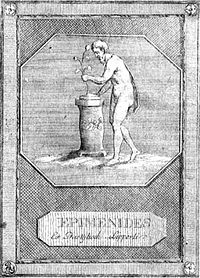Epimenides
While tending his father's sheep, Epimenides is said to have fallen asleep for fifty-seven years in a Cretan cave sacred to Zeus, after which he reportedly awoke with the gift of prophecy (Diogenes Laërtius i.
The only reward he would accept was a branch of the sacred olive, and a promise of perpetual friendship between Athens and Knossos (Plutarch, Life of Solon, 12; Aristotle, Ath.
Athenaeus also mentions him, in connection with the self-sacrifice of the erastes and eromenos pair of Aristodemus and Cratinus, who were believed to have given their lives in order to purify Athens.
Diogenes Laërtius preserves a number of spurious letters between Epimenides and Solon in his Lives of the Philosophers.
According to another story, he was taken prisoner in a war between the Spartans and Knossians, and put to death by his captors, because he refused to prophesy favourably for them.
Its only source is a 9th-century Syriac commentary by Isho'dad of Merv on the Acts of the Apostles, discovered, edited and translated (into Greek) by Prof. J. Rendel Harris in a series of articles.
[2][3][4] In the poem, Minos addresses Zeus thus: Τύμβον ἐτεκτήναντο σέθεν, κύδιστε μέγιστε, Κρῆτες, ἀεὶ ψευδεῖς, κακὰ θηρία, γαστέρες ἀργαί.

